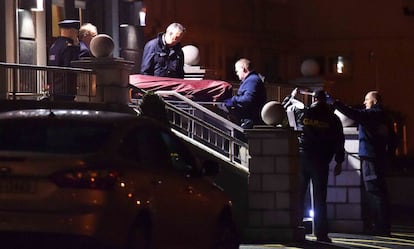Turf war between Irish mafias spills over into Marbella
Two gangs are fighting for control of the drug trade between Spain and Ireland

War has broken out among Ireland’s drug mafias, and one of the sides in the conflict, led by crime boss Christy Kinahan, operates out of Spain’s Costa del Sol in Málaga province.
The attack last month at the Regency Hotel in Dublin, when half a dozen masked men armed with AK-47s burst into a weigh-in for the World Boxing Organization’s European lightweight title fight and killed one of Kinahan’s bodyguards, made international headlines. In turn, the Irish and Spanish police accuse Kinahan and his two sons of involvement in around 10 killings in recent years, three of them in Málaga.
The Dublin killing was reportedly in revenge for the shooting of Gary Hutch, who was gunned down in the Málaga resort of Mijas on September 25, 2015. Hutch’s uncle, Gerry, also known as “The Monk,” allegedly swore vengeance on Christy Kinahan.
Kinahan has always avoided violence, unless it’s really necessary for business” Organized crime expert
Gary Hutch had moved to Marbella and joined Kinahan after serving a prison term in Ireland. “But he also had links to his old mates in Dublin. It looks like he was playing both sides off against each other and that’s a tactic that tends to end badly,” says a Costa del Sol source, suggesting a motive for the slaying in the Irish capital.
“A killing is a way of sending a message,” says a Spanish police source. “And following the attack in Dublin, the Monk’s men wanted to make it clear they would get their own back for the death of Gary.” But the Irish media says the real target at the Regency Hotel on February 5 was Christy’s youngest son Daniel Kinahan, who managed to escape through a window before the gunmen could target him.
The violence overshadowed the election campaign in Ireland, where voters went to the polls to elect a new government on February 26. Despite a heavy police presence throughout the Irish capital, the Garda were unable to prevent further violence, and Eddie Hutch, the Monk’s 50-year-old brother and a father of five, was gunned down at his modest home in Dublin’s working-class north side four days after the Regency killing.
“Eddie was an easy target, he had nothing to do with the family business and was unprotected,” says an expert on Ireland’s organized crime gangs. “His killing was a way of hitting back at the Monk.”
Video: The moment the Regency Hotel shooting began in Dublin.
But the same source adds that the killing of Eddie Hutch was not in the style of Christy Kinahan: “He’s always avoided violence, unless it’s really necessary for business: he likes to keep a low profile and avoid attracting the attention of the police and the media. The killing of Eddie Hutch shows that perhaps Christy no longer controls all of his men.”
The sporadic outbreaks of violence between Dublin’s gangs have until now only been a problem for the Irish authorities, says a retired Spanish police officer. “But now they are a threat for countries like Spain. It isn’t just that the activities of these groups have become an international problem, it’s that Christy Kinahan has become a major European organized crime player. The Costa del Sol has been a playground for British criminals for decades. They always talk about the climate, but what really interests them is the proximity to Morocco, a major drug exporter, and to Gibraltar, a center for the movement of capital of all types of origin; there’s also an international airport nearby [in Málaga], and the real-estate market gives them enormous money-laundering opportunities.”
Christy Kinahan settled on the Costa del Sol in 2001 after being released from a second prison term in Ireland. Dapper Don, as he is also known, is a former drug addict who spent his time in jail not just detoxing, but studying Spanish, Dutch and French. Once he was out, the now 57-year-old soon built up a network of contacts in Marbella who could supply him with hashish from Morocco and cocaine from Latin America and began sending drugs to Ireland hidden in Spanish food exports. Once things got going, he also began supplying the United Kingdom, and then expanding his business to include weapons.
They always talk about the climate, but what really interests the criminals about the Costa del Sol is the proximity to Morocco and Gibraltar A retired Spanish police officer
By the end of the decade, Kinahan had reportedly amassed a fortune worth several hundred million euros. “He was clever enough to avoid getting into the fights between different gangs in Ireland,” says a source in the Irish security forces. “He became a reliable supplier for all the gangs in Ireland. Eventually, they began fighting turf wars in Dublin, and they were doing it over Kinahan’s drugs and with weapons supplied by him.”
But Christy Kinahan soon attracted the attention of the Spanish police, who began looking into his activities following the gunning down of Paddy Doyle in February 2008 on a roadside on the outskirts of Estepona as he tried to flee an ambush. Two days later, the Irish police intercepted 1.5 tons of marijuana hidden in a crate of Spanish foodstuffs that eventually led them to Christy Kinahan.
Europol now became involved, and on the morning of July 7, units from Ireland, Spain, the United Kingdom, Belgium and the Netherlands met at The Hague to share information and establish a joint strategy. This led to the seizure in March 2009 in London of a cache of semiautomatic weapons. A man with links to Christy Kinahan was arrested and further investigation pointed to the guns originating from the Costa del Sol. “Kinahan’s luck changed for the worse when the British police realized he was a threat to the United Kingdom as well,” say sources close to the investigation.
Just over a year later, on the morning of May 25, 2010, more than 700 police officers from Spain, Ireland, the United Kingdom, Belgium and the Netherlands brought a two-year operation to a close with around 100 raids throughout Europe that resulted in 34 arrests. Operation Shovel briefly netted Christy Kinahan himself, along with his sons Daniel and Christy Junior. Also arrested were John Cunningham and Michael McAvoy: the former had been jailed in Ireland for the kidnapping of Jennifer Guinness, the heiress to the Irish brewing empire, and the latter had done time for his involvement in the legendary Brink’s-Mat heist at Heathrow Airport in 1983, when thieves got away with millions of pounds’ worth of gold and diamonds.
Kinahan is a former drug addict who spent a stay in jail not just detoxing, but studying Spanish, Dutch and French
Spanish investigators say Christy Kinahan ran a highly organized operation in Spain, with his sons Daniel and Christy Junior taking care of security and finances, respectively. The latter laundered hundreds of millions of euros throughout some 20 countries, investing in areas such as property, services, cement, sugar and the meat industry – the firms were in turn used to traffic drugs and arms. “The objective is simple: if you move containers all over the world you can soon see which of them are the most secure routes and then use them to smuggle anything you want,” says a Spanish police source.
But Operation Shovel was far from the end of Christy Kinahan and his activities. “Expectations were very high, but the results haven’t been as satisfactory as was hoped,” admits Julio Martínez Carazo, a senior public prosecutor based in Málaga.
Investigations into money laundering and conspiracy are ongoing, but the judge overseeing the case dismissed the drugs and arms trafficking charges in 2013 because of lack of evidence. The drugs and weapons had been sent from a company based in Murcia to the United Kingdom and Ireland and paid for by front companies based in Málaga that the police say are linked to Christy.
Martínez Carazo says that Kinahan and his associates will be brought to trial “within a few months” and that all that remains to be done is to complete the paperwork with the UK authorities.
Sources close to the investigation say that Operation Shovel delivered a major blow to Kinahan: “It took away a good part of Kinahan’s money and has made it very hard for him to find reliable partners due to the close surveillance they and others are under.” The source cites the MGM gym in Marbella run by Christy: “The police have been watching it for months, noting who goes in and who comes out, and then looking into their backgrounds.”
The sudden vulnerability of Kinahan has encouraged other criminals to try to step into his shoes
Organized crime is a dog-eat-dog world, and the sudden vulnerability of Kinahan has encouraged other criminals to try to step into his shoes. Irish police sources quoted by the media in Ireland say that the Regency attack could be “the first step in a takeover bid” led by Gerry Hutch and Scottish criminal gangs.
EL PAÍS has not been able to confirm this, but sources say that the increase in tit-for-tat killings “suggest something is going on. When a group is really powerful it is able to impose order without the need for killings,” he adds. The deaths over the last 18 months seem to point to a need to bring gang members to heel.
Gerard Kavanagh, aged 44, was gunned down at an Irish pub called Harmons in Marbella in September 2014. Spanish police say he was a debt collector for Kinahan suspected of going solo and keeping money back. Six months later, in March 2015, his brother Paul, aged 26, was killed as he left his home in Dublin. The death of Gary Hutch in Mijas could have prompted the attack at the Regency.
The slaying in Dublin is just another example of the violent, close-knit, and at times contradictory world of the Irish mafias. The fighter at the weigh-in seen fleeing from the gunfire at the Regency in the video footage is Jamie Kavanagh, the son of Gerard Kavanagh. After the death of his father and uncle, he temporarily retired from the ring. This year was supposed to mark his return to boxing and the fight in Dublin was his chance to make a comeback. But once again, his plans have been disrupted. “Boxing is really easy. Life is much harder,” said Floyd Mayweather once. His words could describe the last 18 months in the life of Jamie Kavanagh.
Tu suscripción se está usando en otro dispositivo
¿Quieres añadir otro usuario a tu suscripción?
Si continúas leyendo en este dispositivo, no se podrá leer en el otro.
FlechaTu suscripción se está usando en otro dispositivo y solo puedes acceder a EL PAÍS desde un dispositivo a la vez.
Si quieres compartir tu cuenta, cambia tu suscripción a la modalidad Premium, así podrás añadir otro usuario. Cada uno accederá con su propia cuenta de email, lo que os permitirá personalizar vuestra experiencia en EL PAÍS.
¿Tienes una suscripción de empresa? Accede aquí para contratar más cuentas.
En el caso de no saber quién está usando tu cuenta, te recomendamos cambiar tu contraseña aquí.
Si decides continuar compartiendo tu cuenta, este mensaje se mostrará en tu dispositivo y en el de la otra persona que está usando tu cuenta de forma indefinida, afectando a tu experiencia de lectura. Puedes consultar aquí los términos y condiciones de la suscripción digital.









































